San Diego Mesa College Research Interns Spread Their Wings in UC San Diego Labs
A partnership between the community college and UC San Diego Altman Clinical and Translational Research Institute expands training opportunities to enhance the STEM workforce.
Story by:
Published Date
Story by:
Topics covered:
Share This:
Article Content
Luna Glenn Reyes has always observed patterns in the world around her, which has led to questions such as why diabetes seems to run in her family and why people living in certain places enjoy better health than others.
During the summer of 2024, Reyes took her keen eye for patterns a step further. As an intern with the CreAting Dedicated Scientists through Research Education (CADRE) program, she worked in a University of California San Diego lab learning to use the tools of biostatistics to make sense of her observations.
Reyes was one of seven San Diego Mesa College students making up CADRE’s inaugural cohort of interns. The program provides paid research opportunities for community college students to develop biomedical research skills in the lab and clinic. CADRE is the result of a partnership between the Mesa Impactship Program (MIP) and the Community Research Partnerships Initiative at UC San Diego’s Altman Clinical and Translational Research Institute (ACTRI) and is supported by the National Center for Advancing Translational Sciences within the National Institutes of Health (NIH).
Each student in the CADRE program was matched with a UC San Diego School of Medicine faculty mentor based on their interests, and spent eight weeks conducting hands-on research in their laboratories.
“Research shows that students who participate in internships have greater success when they enter the workforce,” said Shawn Fawcett, assistant professor and work-based learning and work experience coordinator at San Diego Mesa College, who helped facilitate the CADRE program. “The partnership between MIP and CADRE is really special because it’s seeking out this pipeline of students under mentorship of these esteemed faculty to do innovative research.”
Students often have to balance jobs unrelated to their field of study to support themselves, leaving a limited amount of time to pursue professional development opportunities. CADRE interns were primarily supported with work-study funding through their UC San Diego mentor.
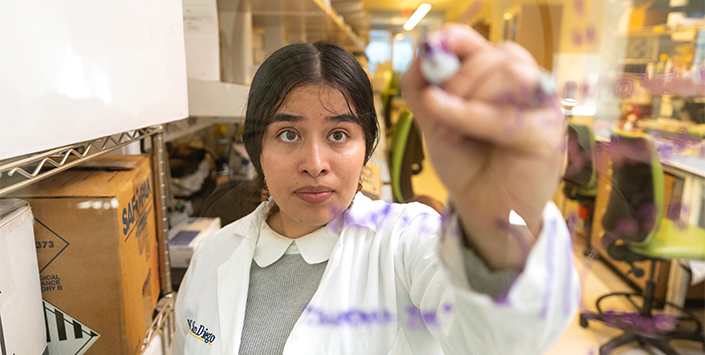
“There's not only course credit, but also financial compensation, which makes it both accessible and attainable for people that might have other pressures and burdens in their life that may put them at a disadvantage,” said Lindsey Burnett, M.D., Ph.D., an assistant professor in the Department of Obstetrics, Gynecology & Reproductive Sciences at UC San Diego School of Medicine, who served as Reyes’ CADRE mentor.
“As the largest academic medical center in our region, UC San Diego has a profound responsibility to cultivate and expand scientific talent by ensuring access to opportunities for all members of our community,” said Edward “Lalo” Cachay, M.D., professor of medicine and director of community research partnerships at ACTRI. “The CADRE program is a vital initiative that addresses systemic barriers to scientific education, particularly for community college students, by providing early access to specialized training and laboratory experiences.”
San Diego Mesa College has long emphasized the importance of experiential learning as part of its commitment to workforce training.
“Our mission is to expose students on our campus to at least one component of internship work experience so that they get hands-on training before transferring,” said Pavel Consuegra, an adjunct professor and work-based learning internship coordinator with the Mesa Impactship Program. “We try to work with the student population as soon as they join Mesa College. With CADRE, we saw the opportunity to expose our students to a high-end research institution.”
“As the largest academic medical center in our region, UC San Diego has a profound responsibility to cultivate and expand scientific talent by ensuring access to opportunities for all members of our community.”
But the CADRE program goes well beyond simply placing students in UC San Diego labs. It provides a structure to support students as they engage in research for the first time. The first cohort of interns took a course led by a San Diego Mesa College faculty mentor to boost their success and complement their research experience.
In the class, the students developed learning objectives for their internship and worked toward those goals throughout the summer, said Fawcett.
“The course is a bit non-traditional, but it does allow students that are getting hands-on experience to develop their professional skills and get support from faculty as they navigate the workplace,” she said. “They get consistent career development support from Mesa faculty as well, which is super important, especially for underserved populations, which often have little or no work history.”
For some students, the internship was a crash course in how to have a job. “You have to fill out your time card, you have to send emails, and correspond with your supervisors,” said Carlos Rojas, director of operations and research services at ACTRI. But more than anything, it was a deep dive into science, the scientific method and life in the lab.
“The thing I heard most is that they had no idea that such a thing existed as a profession,” said Rojas. “It was one of our main goals to just expose people to these things that are truly potential career fields."
To be matched with their UC San Diego mentors, the students went through formal interviews at the labs which interested them. During the internship the cohort met regularly at ACTRI, attended career seminars, and toured campus. They concluded the summer by presenting short talks about their research projects. Remarkably, most of the CADRE interns, including Reyes, extended their internships well beyond the eight-week summer session. Those that did not were either hired part-time in their mentor’s laboratory or went on to a different internship at another research institution."
“These are remarkable students that in every way have impressed us,” said Rojas. “The energy and enthusiasm I've seen out of them, UC San Diego could use that. These truly are, I think, future leaders. They have a non-traditional path, but nonetheless, UC San Diego wants people like this."
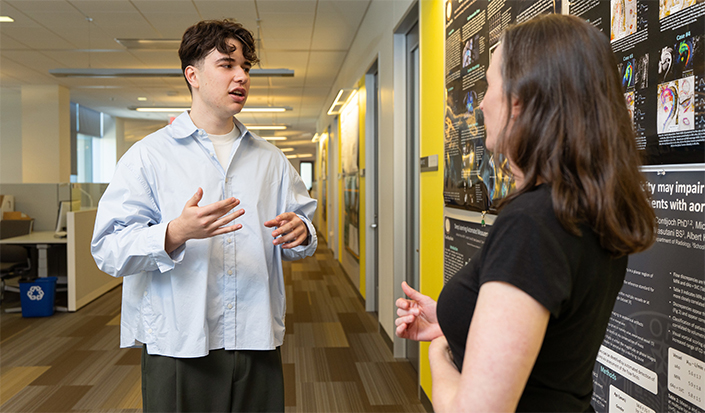
Oleksandr Sharlai investigated amnesia in people with traumatic brain injuries or other neurological disorders with mentor Christine Smith, Ph.D. Photo credit: Kyle Dykes/UC San Diego Health Sciences
The 2025 CADRE internship will take place between June 2 and August 29. San Diego Mesa College students may apply through the Mesa Impactship Program.
Follow the journey of three CADRE interns
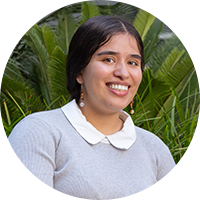
Read Luna’s story: The Language of Numbers - Luna Glenn Reyes
Luna Glenn Reyes has always excelled at math. As a CADRE intern in the laboratory of Lindsey Burnett, M.D., Ph.D., she used her love of numbers and the tools of biostatistics to investigate women’s pelvic floor disorders.
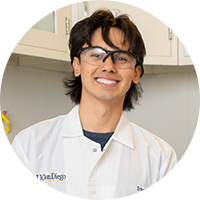
Read Alec’s story: Career Anatomy — Alec Guerra
After discovering a love of anatomy in high school, Alec Guerra was inspired to become a doctor. Through his CADRE internship in the lab of Sara Gianella Weibel, M.D., he participated in several autopsies as part of ongoing research investigating how HIV persists in tissues throughout the human body.
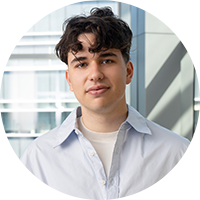
Read Oleksandr’s story: A Passion for Mental Health - Oleksandr Sharlai
After leaving Ukraine following the Russian invasion, Oleksandr Sharlai was determined to continue his dream of becoming an M.D./Ph.D. and studying the human brain. During his CADRE internship, he worked in the lab of Christine Smith, Ph.D., investigating amnesia in patients with traumatic brain injuries or other neurological disorders.
Other 2024 CADRE interns included Mesa College students Mya Hanauska and Meghana Nilugal, mentored by Alessandra Castaldi, Ph.D., Swarali Barhate, mentored by Christine Smith, Ph.D., and Winston Mutter, mentored by Paula Desplats, Ph.D.
Stay in the Know
Keep up with all the latest from UC San Diego. Subscribe to the newsletter today.




